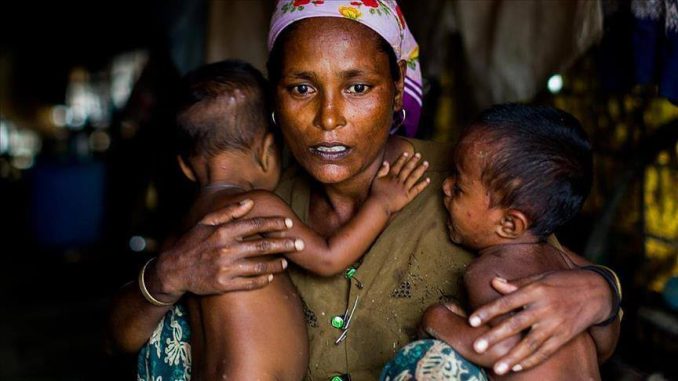
For years, the Rohingya, an ethnically distinct Muslim minority, have clashed with the majority Buddhist population in Burma, also known as Myanmar. A group of 400 Rohingya women survivors of human rights violations at the hands of the Burmese military, who are living in refugee camps in Bangladesh, after fleeing the country for their lives, called themselves the “Shanti Mohila”, which means “peace women” in Rohingya. Brought together by their trauma, the women began meeting in the Kutupalong-Balukhali settlements, a Rohingya refugee camp in Bangladesh. Sometimes, up to 40 women would squeeze into a single shelter to talk about their experiences.
Last year, RAW paid special tribute to Jamalida Begum, a brave Rohingya survivor of rape by Myanmar security forces, currently a refugee in Bangladesh, who, in 2016, spoke out about her own rape and that of three other women in her village and continued to denounce their treatment publicly, at severe personal risk. In so doing, Jamalida Begum played a significant role in drawing the world’s attention to the grave human rights violations being committed against/inflicted on the Rohingya population, including sexual violence committed against Rohingya women and girls, in Myanmar. She is a Brave Voice Refusing To Be Silenced and joined a growing RAW community of women survivors and activists who speak out against atrocities and violations against civilians in conflict zones around the world.
By mid-2018, 400 Rohingya women survivors had joined the voice of Jamalida Begum, organizing themselves in the camps of Bangladesh to form the organization, Shanti Mohila [Peace Women], and to demand justice for themselves and for all survivors of violence from Myanmar. On 30 May 2018, the Shanti Mohila submitted a formal request to the International Criminal Court (ICC) for an investigation into genocide and persecution.
As part of the request to the ICC, the Shanti Mohila have submitted individual testimonies and gathered some 400 signatures from Rohingya women. Their declaration states: “We are Shanti Mohila of Rakhine state. We are leaders of our community. We are from Rohingya identity, and we want justice.”
They are Brave Voices Refusing To Be Silenced and we are moved by their courage and their determination to awake the international community and to see justice done.
On announcing the winners of the 2018 Anna Politkovskaya Award, Leila Alikarami, 2009 Award winner from Iran and a member of the 2018 Award Nominations Committee, said:
“Listening to the stories of Rohingya women, I became ashamed of humanity. In 2018, a woman told me how soldiers grabbed her baby by the leg and threw her onto the fire and how soldiers had executed the men and boys in her village, had made a bonfire of their bodies, had set their homes and villages on fire and then had taken the women to rape them. Unfortunately, it is not only the Rohingya women who are suffering militarism and violence.
Many women from conflict zones, from countries that are in war like Syria, Yemen and Palestine, are fighting for peace, human rights and justice. They put their lives at risk. They have lost their loved ones. We cannot even imagine the gravity of their pain. But what we can do for them is to help raise their voice, is to support them by making their stories known, by sharing their pain and by contributing to their cause. We are here, far away from conflict zones, but it is our duty to stand by our sisters in those areas and help them keep their hope. I strongly believe that human rights cannot exist without humanity.”
RAW in WAR continues to urge the government in Myanmar to end the killing of the Muslim population and the sexual violence against women and girls in Rakhine state immediately. RAW in WAR calls on the government of Bangladesh and the international community to provide the necessary protection to refugees from Myanmar in Bangladesh, including to Jamalida Begum and her sons and father and all 400 women survivors from “Shanti Mohila”.
